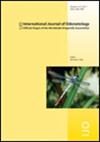秘鲁豆娘蝇一新种(豆娘目:豆娘科)并附有所有已知inpabasis物种的图解钥匙
IF 1
4区 农林科学
Q3 ENTOMOLOGY
引用次数: 0
摘要
对Inpabasis intermedia sp. n.(全型♂:秘鲁,Loreto Región)进行了描述和说明。一个图解的钥匙两性给所有成员属。从翼胸的暗区和亮区之间的侧面角度划分,通过短的不分枝的副喙和圆形的尾端,只有一个小的尖齿,以及生殖器舌有两个长尖突,末端有一个扁平的钩,可以区分出中间的雄性。雌性可以通过胸后叶背向后指向,后缘直来区分。http://www.zoobank.org/urn:lsid:zoobank.org:pub:18F2C9D3-28BC-4329-A001-657860A858AB本文章由计算机程序翻译,如有差异,请以英文原文为准。
Inpabasis intermedia, a new species of damselfly from Peru (Odonata: Coenagrionidae); with an illustrated key to all known Inpabasis-species
Inpabasis intermedia sp. n. (holotype ♂: Peru, Loreto Región) is described and illustrated. An illustrated key to both sexes is given for all members of the genus. Males of I. intermedia can be distinguished from its congeners by the angled division laterally between dark and light areas of the pterothorax, by the short unbranched paraprocts and rounded cerci which bear only a small apical tooth and by the genital ligula with two long apical processes ending in a flattened hook. Females can be distinguished by the dorsoposteriorly directed posterior prothoracic lobe with straight hind margin. http://www.zoobank.org/urn:lsid:zoobank.org:pub:18F2C9D3-28BC-4329-A001-657860A858AB
求助全文
通过发布文献求助,成功后即可免费获取论文全文。
去求助
来源期刊

International Journal of Odonatology
ENTOMOLOGY-
CiteScore
2.30
自引率
0.00%
发文量
15
审稿时长
>12 weeks
期刊介绍:
International Journal of Odonatology (IJO) is aimed at providing a publication outlet for the growing number of students of Odonata. It will address subjects such as the ecology, ethology, physiology, genetics, taxonomy, phylogeny and geographic distribution of species. Reviews will be by invitation, but authors who plan to write a review on a subject of interest to the journal are encouraged to contact the editor.
 求助内容:
求助内容: 应助结果提醒方式:
应助结果提醒方式:


